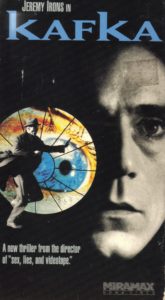 A handsomely mounted, well made film that’s otherwise total nonsense. Purporting to be about Franz Kafka and featuring some distinguished actors, it’s a thoroughly misconceived project that’s alternately boring and stupid.
A handsomely mounted, well made film that’s otherwise total nonsense. Purporting to be about Franz Kafka and featuring some distinguished actors, it’s a thoroughly misconceived project that’s alternately boring and stupid.
KAFKA (1991) was the second film by director Steven Soderbergh, following up his monumentally successful 1989 debut SEX, LIES AND VIDEOTAPE. The two films couldn’t be more different, and taken together showcase a mercurial personality who likes to work in as many styles and genres as he possibly can. This brings up the question of whether Mr. Soderbergh really should be so freewheeling in his choice of subject matter, as it’s become abundantly clear over the years that his talents don’t encompass the horror or sci fi genres.
To be sure, Soderbergh has made some wonderful films (including TRAFFIC, BUBBLE and the shamefully neglected KING OF THE HILL), but also many crappy ones (including the interminable OCEAN’S… trilogy and the excruciating SOLARIS remake). KAFKA falls into the latter category.
Franz Kafka is a lowly insurance worker. He’s hoping to break out of his dull existence by writing stories like one he has in the works about a guy turning into a giant insect.
A cackling madman is on the loose, murdering seemingly anyone he comes across, while at the same time Kafka finds himself drawn into a loopy mystery when a co-worker is killed. Kafka is lured to a nighttime meeting of a group of bomb-throwing anarchists led by the seductive Gabriela, another co-worker. The group believes a massive cover-up is being conducted by the overseers of the Castle, a secretive environ at the edge of the city from whence the cackling killer emerges.
Kafka’s investigations invariably lead to the Castle. Insinuating his way inside, Kafka finds a bunch of corrupt scientists, led by the evil Dr. Moreau, conducting scary experiments involving a giant telescope and peoples’ exposed brains. Kafka disrupts the process and runs off, narrowly escaping with his life.
This experience is apparently so impacting that Kafka is inspired to give up his obsessions and neuroses (in other words, everything the real Franz Kafka stood for) and stop writing his freaky fiction in favor of reassuring prose, to “make our living and dying a little bit easier.”
Steven Soderbergh has talent, as he demonstrated in SEX, LIES AND VIDEOTAPE, and shows once again that he knows to set a scene like nobody’s business. The cinematography of Walt Lloyd, much of it in black and white, is luminous and evocative, and the production design equally so in recreating the majesty of early 20th Century Prague.
Outside those things, however, there’s just not a whole lot here. Yes, many heavyweight actors share the screen (Jeremy Irons, Jeroen Krabbe, Ian Holm, Joel Grey, Armin Mueller-Stahl, Alec Guinness), but none manage to distinguish themselves. Among other things, the performances are hampered by the fact that nearly every actor speaks in a different accent. There’s also the problem of Theresa Russell in the female lead, who (as usual) appears to be performing in an entirely different movie than everyone else.
This film isn’t merely bad but also insulting to the life and art of the Franz Kafka, who Jeremy Irons allegedly plays. Despite occasional biographical allusions to Kafka’s life (at one point Kafka asks a cohort to burn his manuscripts should he die, a request he actually made to his friend and eventual literary executor Max Broad) and fiction (THE CASTLE in particular), there’s very little about this film that’s truly Kafkaesque. In essence it’s a pretentious B-movie, complete with nerdy movie in-jokes (characters are named Moreau and Orlac) and dialogue like “You’ll never reach a man’s soul through a lens!”
For those interested in something authentically Kafkaesque, I’d recommend the 1963 Czech film JOSEF KILIAN, a striking and accurate rendering of Franz Kafka’s surreal world in cinematic terms. It leaves KAFKA looking like the lame student film worthy exercise it is.
Vital Statistics
KAFKA
Baltimore Pictures/Miramax Films
Director: Steven Soderbergh
Producers: Harry Benn, Stuart Cornfeld
Screenplay: Lem Dobbs
Cinematography: Walt Lloyd
Editing: Steven Soderbergh
Cast: Jeremy Irons, Theresa Russell, Joel Grey, Ian Holm, Jeroen Krabbe. Armin Mueller-Stahl, Alec Guinness, Brian Glover, Keith Allen, Simon McBurney, Robert Flemying
